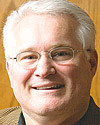Mark Holmes is helping boomers acclimate to the new ideas and methodologies of a growing millennial workforce.
2017 Projection: Employers will rethink the workplace by dropping traditional stereotypes and see millennials for what they can bring to the table.
SBJ: With five generations in the workforce, what’s the outlook for 2017?
Mark Holmes: On the bookends, you have the traditionalists in their 70s and on the other end you have the Z’s. (Millennials) will be 50 or 55 percent of the entire workforce in the next year. Then you have the (Generation) Xers in the midpart of their career and the (baby) boomers, like me, hanging around and finding our way out. This is all a mishmash boiling pot of views on work and certainly different needs.
SBJ: This isn’t the first time we’ve had multiple generations in the field. Why is it so difficult now?
Holmes: The world has changed. Change has changed. Change is ongoing now, it’s more turbulent and it’s more unpredictable post-recession. Whereas in my career, change was predictable, you had business cycles. Everything about change has changed and that has presented a lot of the challenge.
SBJ: How are millennials changing the workforce?
Holmes: From a 30,000-foot view, millennials are pushing leaders to change the way they view change. They see it as a tool and normal. There are a lot of boomers that see it as something to be tolerated. They are more reactive. It’s causing boomers to decouple from their orthodoxy. Leaders are struggling with making necessary changes because they want to hold on and that frustrates the millennials working for them.
SBJ: Why is there so much tension between the two generations?
Holmes: Millennials age right now from about 16 on the low end to about 36. That’s a 20-year gap. I find on the young side, they have a very different set of needs and views than the more mature millennials. As they come into a workplace, it’s counterproductive for a boomer leader to look at them and say because you are a millennial, you fit in this box. That creates strife and tension.
SBJ: Are older generations scared of millennials?
Holmes: I notice that all the time. I can’t tell you the number of clients who just don’t understand them.
Take the oil and gas space for example, their recent studies show of employees 20-24 years of age, on average they will stay about 16 months. They are just dumbfounded by that – why are they so quick to change? Millennials approach the workplace different than boomers. I went to work anticipating staying unless I saw valid reasons to leave. But millennials go to the workplace with the intention to leave unless they see valid reasons to stay. That says we want training, development, mentors. That has startled a lot of business owners.
SBJ: What can companies do to retain millennials?
Holmes: No. 1; look at the culture. You have to shape the culture and work environment into a kind of place a millennial wants to work at. They want to enjoy the workplace. They are less tolerant of something they don’t enjoy. They’ll leave. It doesn’t bother them to have seven or eight places on their resume.
The second thing is look at the issue of training and development. Millennials don’t want to be discounted for their lack for experience.
Third, don’t look at your company as a one size fits all. You need to change up how you do your rewards, incentivize systems and how you manage and lead people.
SBJ: So going forward, how can companies get buy-in from the millennials without creating too much change for older generations?
Holmes: You involve everybody. I would be a lot more quick to do employee surveys and get feedback. You’ve got to make communication a dialogue. We formalize communication way too much. Today’s employees don’t want to wait for a one-year annual review.
SBJ: What’s the biggest myth when it comes to millennials?
Holmes: One of the things we’ve been told as boomers is they want to be coddled and you can’t tell them when they are doing something wrong. In our research, we found just the opposite. Yeah, they want to hear what they are doing right, but the generation is very balanced in this; they also want to know how they can improve. I know boomer managers who just sidestep the issue. Leaders have to be better at leading change, not managing change.
[[In-content Ad]]
